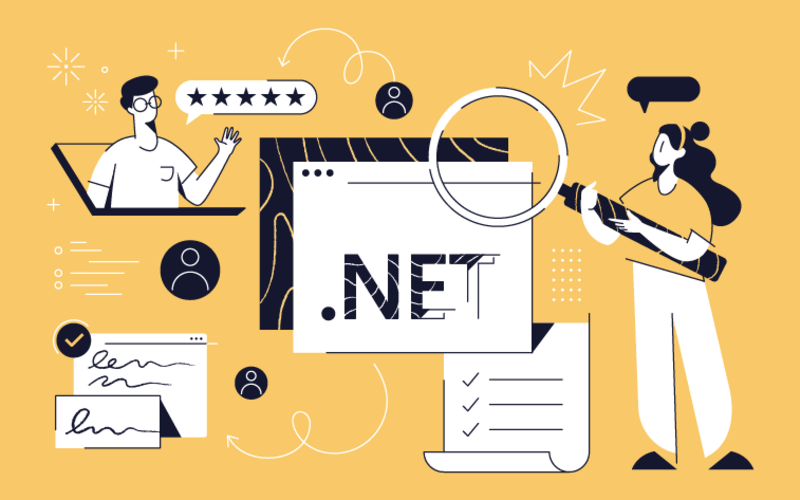NEW
Proxify is bringing transparency to tech team performance based on research conducted at Stanford. An industry first, built for engineering leaders.
Learn more
Hiring skilled .NET Developers is no small feat, but it's essential for your company's success. You need people capable of doing the job at hand and can grow and develop their skills as required.
Many factors go into hiring skilled .NET developers. These include:
-
The level of experience of the developer.
-
How quickly they can start working for your company.
-
Their work ethic, education, and experience in their field, and how well they communicate with other members of your team.
But, before you plan out the whole hiring process, you need to start at the basics, with a well-assembled job ad for .NET developers. Let's dig a little deeper.
Technical skills of a .NET Developer
As you seek to hire a .NET Developer, evaluating their technical skills is crucial to ensure they possess the necessary expertise for your tasks. Below are some of the most important technical skills you should look for when hiring a .NET Developer:
-
C# language proficiency: C# (pronounced as C sharp) is the primary language in .NET development. A skilled .NET Developer should have a strong command of C#, including its latest features, best practices, and idiomatic usage. Proficiency in C# will allow developers to write efficient, maintainable, and scalable code.
-
ASP.NET and ASP.NET Core: ASP.NET is a web application framework for building dynamic and data-driven web applications. More recently, ASP.NET Core has gained popularity due to its cross-platform capabilities. A competent .NET developer should be well-versed in ASP.NET and ASP.NET Core, enabling them to create web applications with rich functionality.
-
Entity Framework (EF) and database management: Entity Framework is the ORM (Object-Relational Mapping) tool used in .NET development to interact with databases. A skilled .NET developer should be familiar with EF and understand database management concepts like data modeling, migrations, and query optimization.
-
Web APIs and RESTful Services: Web APIs are essential for building modern applications that communicate with external systems or enable interactions between frontend and backend components. A competent .NET developer should know how to design, implement, and consume Web APIs and RESTful services.
-
Frontend development: While .NET developers primarily focus on backend development, having a basic understanding of frontend technologies like HTML, CSS, and JavaScript can be advantageous. It allows them to collaborate better with frontend developers and address frontend-backend integration challenges effectively.
-
Version Control Systems: Proficiency in using version control systems like Git is vital for collaboration and efficient code management. A .NET developer should be comfortable with branching, merging, and resolving conflicts within a version control environment.
-
Testing and debugging: A skilled .NET developer should be adept at writing unit tests and integration tests and performing debugging to ensure the reliability and quality of their code. Familiarity with testing frameworks like nUnit or xUnit is valuable.
Alexandra Țigău-Almășan, a .NET developer at Proxify, says that a developer's skill level is vital to keep in mind when you are considering hiring them. However, debugging is a valuable skill to have.
"Being able to debug an application without much knowledge is a nice technical skill. Other important skills, I would say, are having some SQL knowledge for at least simple queries, understanding SOLID principles, and writing clear, understandable, and scalable code."
Alexandra Țigău-Almășan
-
Security best practices: Security is a critical aspect of software development. A proficient .NET developer should know common security vulnerabilities and follow best practices to protect applications from threats.
-
Performance optimization: Optimization of application performance is crucial for delivering a responsive and efficient user experience. A skilled .NET developer should be able to identify performance bottlenecks and implement optimizations when necessary.
Remember that while technical skills are essential, a well-rounded .NET developer should also possess strong problem-solving abilities, good communication skills, and a willingness to learn and adapt to new technologies and trends in the ever-evolving world of software development.
Hiring a .NET developer
With the rapid changes in the .NET ecosystem, it is more important than ever to hire the best .NET developers.
But how do you find them?
Three key factors will help you determine whether or not your candidate has what it takes for this position:
-
First, ask about their knowledge of .NET. This includes how long they have been using it and what kind of engagements they've worked on. You should also ask them about their familiarity with specific features like ASP.NET MVC 6, C# 7, and LINQ queries.
-
Second, ask about their experience working with languages like Java or Python and frameworks like Angular.js or Node.js. This will help give you an idea of whether or not they have a good grasp on coding practices in general rather than just those specific to Microsoft technologies alone (which can be helpful when deciding if someone will fit into your organization's culture).
-
Finally, ask about their attitude toward learning new things. Your candidates must know their stuff but also be willing to keep learning more about what makes this industry great so that they can stay up-to-date with current trends as well.
"As developers, we are always curious about what new technologies and versions appear. That's also the case for a .NET developer. Compared to other languages, .NET went from .NET Framework to .NET core and introduced several new features, so as developers, we always have to keep up with what's new and cool."
What makes the best .NET developers stand out from other applicants?
Competition can be fierce during the hiring process for a .NET developer. While technical skills and experience are crucial, the best .NET developers stand out from other applicants because of their proficiency with the technology and exceptional qualities and mindset. Here are some key traits that distinguish the best .NET developers, making them invaluable assets to any development team:
- They know how to write good code.
Writing good code is not just about following best practices and using the right tools but also learning how to use those tools correctly. The best developers have a solid understanding of object-oriented design principles, how to use design patterns effectively and when to use them, and how to write maintainable code for their peers or future employers.
"What differentiates the great developers from the good ones is that they know what code can work well today but could also become obsolete in the future."
- The best .NET developers are excellent problem solvers.
They're able to analyze complex systems and come up with practical solutions that work. They combine technical skills with creative thinking to find answers others may have yet to consider.
- They are also flexible and adaptable.
They can learn new technologies quickly, take those skills and apply them in different contexts. This makes them valuable employees for companies looking for someone to support various engagements simultaneously.
- They're passionate about what they do.
Great developers want more than just money – they want an opportunity to learn new things, solve interesting problems, and work with talented people daily.
"Besides technical skills, a great developer should be able to explain and share the accumulated knowledge with the other developers from the company. It is even better if a developer can explain a particular task or issue to a non-technical person and make them understand."
How to assess a .NET developer quickly and efficiently
If you're hiring a .NET developer, you probably know finding good ones is hard. They're in high demand, and there are a lot of people who think they can do the job.
You need to ensure you're not just hiring someone with a great CV and theoretical knowledge of .NET. You need someone who knows how to apply their skills in real-life scenarios and will fit into your team and contribute to its success.
"I prefer to ask for something other than theoretical things, so I would give small problems that can make me understand if that person had a good foundation since we need it to be great developers. Also, if, in an interview, the developer offers a lot of examples from real life or their experience, I consider that to be a good thing."
Alexandra Țigău-Almășan
The primary things, according to Alexandra, that a .NET developer should know are:
-
A source code editor, such as Visual Studio or Jetbrains Rider
-
A source control system, such as Git or SVN
-
At least a unit testing framework such as Moq or NUnit
Why do .NET developers like working with this framework?
.NET is an enjoyable framework for developers and businesses due to its robustness and versatility.
For developers, .NET offers:
- A rich set of programming languages, including C#, VB.NET, and F#, making it easier to work with familiar tools and enabling developers to choose the language that best suits their preferences and expertise.
"What is nice about .NET is that it can be used to create different applications, which means it can suit several clients and domains. For example, it can be used for web, desktop, mobile, gaming, websites, and even ML applications since it supports known models."
Alexandra Țigău-Almășan
-
The extensive class libraries and frameworks in .NET simplify development tasks, allowing programmers to build feature-rich applications with less effort.
-
.NET's cross-platform capabilities, with technologies like .NET Core and Xamarin, empower developers to create applications that run seamlessly on various platforms, reaching a broader audience.
"The speed of development, tooling systems, support for multiple modern programming paradigms, and transformative impact on software development proves that .NET can do everything. So, if a company had .NET developers, they could develop many applications for versatile purposes."
For businesses, .NET offers:
-
.NET's scalability and performance optimize application responsiveness and improve user experiences, ultimately leading to higher customer satisfaction.
-
Its integration with Microsoft Azure facilitates effortless cloud deployment, enhancing business agility and reducing operational costs.
-
The strong community support and continuous updates from Microsoft ensure that .NET stays up-to-date with the latest industry trends and practices, providing developers and businesses with a cutting-edge development environment that sparks innovation and drives success.
Alexandra reiterates that because of its versatility, .NET can be used everywhere, from small applications to complex scenarios requiring a fast response time.
Interview questions to hire a .NET developer
To help you find the best .NET developer candidate for your business, we've compiled an extensive checklist of questions to ask during an interview. These questions will help you identify if someone has the suitable skill set and personality for your engagement or company.
1. How do you handle performance bottlenecks in .NET applications? Could you mention some standard performance optimization techniques?
Example answer: To handle performance bottlenecks, I start by profiling the application to identify specific performance issues. Common optimization techniques include caching frequently accessed data, using asynchronous programming to improve responsiveness, reducing database round-trips, and optimizing algorithms and data structures. Tools like the Performance Profiler and BenchmarkDotNet can also help identify and resolve performance bottlenecks.
2. What do you think about the architecture of ASP.NET MVC?
Example answer: ASP.NET MVC is a well-designed framework that allows developers to build web applications quickly, efficiently, and maintainable. The framework has been around for a while now, and it remains relevant today because it solves real problems many developers face. An engineer needs to gain experience with ASP.NET MVC, or else it may be a sign that they need to be up to date with current best practices in web development.
3. What do you think about object-oriented programming (OOP)?
Example answer: OOP is a design paradigm used by many programmers today, including C# developers who build object-oriented software systems using OOP principles such as encapsulation, polymorphism, inheritance, etc. Every developer needs to understand how OOP works and its advantages over procedural programming languages like C++ or Java due to its power of abstraction, ability to make software easier to read, write and maintain.
4. Can you explain the concept of garbage collection in .NET and how it helps manage memory?
Example answer: Garbage collection in .NET is an automated process that helps reclaim memory occupied by objects no longer in use. The Common Language Runtime (CLR) periodically scans the managed heap to identify and remove objects without references, freeing up memory. This ensures efficient memory management and reduces the risk of memory leaks.
5. What are the critical differences between ASP.NET Web Forms and ASP.NET MVC? When would you use each?
Example answer: ASP.NET Web Forms use a stateful, event-driven model with controls and view state, while ASP.NET MVC follows the Model-View-Controller pattern, promoting separation of concerns. We would use Web Forms for rapid application development and when a complex UI is required. On the other hand, ASP.NET MVC is suitable for applications requiring more HTML control, testability, and maintainability.
6. How do you handle exceptions in .NET applications? Can you explain the purpose of custom exceptions?
Example answer: In .NET, exceptions are managed using try-catch blocks. We wrap the code that might throw an exception within a try block and handle potential exceptions in the catch block. Custom exceptions are derived from the Exception class, allowing us to create more meaningful and specific exception types, helping with better error handling and debugging.
7. What is the role of the Global Assembly Cache (GAC) in .NET? When and why would you deploy assemblies to the GAC?
Example answer: The Global Assembly Cache (GAC) is a central repository for storing shared .NET assemblies. We deploy assemblies to the GAC when we need to share them across multiple applications on the same machine. It allows for versioning and ensures that the correct assembly version is used across all applications, promoting better stability and maintainability.
8. Can you explain the difference between value types and reference types in .NET?
Example answer: Value types store their actual value directly in memory and are accessed by value. Examples include primitive types like int, float, and bool. On the other hand, reference types store a reference (memory address) to the object's location and are accessed by reference. Examples include classes, interfaces, and delegates.
For more technical questions, here are 10 interview questions from a senior .NET developer you can ask.
Remember to:
-
Ask questions that will give you insight into the candidate's personality and behavior, such as their interests outside of work or what they did in college. This can tell you more about how they might fit into your team culture or if they'll be able to get along with other team members. It also shows them that you care about who they are as individuals and not just as potential team members.
-
Ask questions that will help you understand how well they can communicate with others, both verbally and nonverbally. Such as, "Tell me about a time when you had to explain something complicated to someone else" or “Tell me about a difficult customer service situation where things went wrong and how you fixed it." These questions allow you to probe deeper into how well candidates communicate with other stakeholders.



















